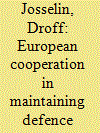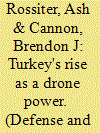| Srl | Item |
| 1 |
ID:
185354


|
|
|
|
|
| Summary/Abstract |
Based on economic geography concepts, this article proposes an original analytical framework to understand co-operation between countries in the Maintenance in Operational Condition (MOC) of defence equipment in Europe. European countries are facing problems of MOC cost growth under strong budgetary and usage constraints. A possible solution is to share costs to benefit from economies of scale. However, as the number of participating countries increases, the “distances” (geographical, normative, political) multiply and generate new costs. These costs are likely to weigh on the choices made by countries and therefore constitute a brake on pooling and sharing initiatives. This article proposes to understand the mutualisation of MOC in Europe through a set of centripetal forces (all the advantages offered by mutualisation) and centrifugal forces (all the costs generated by mutualisation). Such a reading grid makes it possible to consider the multidimensional trade-offs underlying the organisation of MOC in Europe.
|
|
|
|
|
|
|
|
|
|
|
|
|
|
|
|
| 2 |
ID:
185355


|
|
|
|
|
| Summary/Abstract |
Why did Denmark and Norway opt for respectively a domestic “make” and a “buy” abroad approach when acquiring comparable major surface combatants given both host a capable shipbuilding industry? Three explanations are examined: (1) Balancing concerns inch small states towards “buy” abroad decisions, if requirements are deemed urgent and if junior alliance partners fear abandonment by senior partners. Junior partners by contrast prefer “make at home” if entanglement is a greater concern. (2) National innovation systems can be biased towards large projects, such as complex warship programmes, or have a knowledge diffusion focus emphasising niche capabilities. The former point to a “make” decision whereas the latter is inclined towards “buy.” (3) Domestic defence industry advocate “make” decisions with the qualification that weaker firms favour “buy” with offset arrangements. Political executives balance job creation with military capability, but recent adverse domestic procurement experiences may prompt governments to favour “buy.”
|
|
|
|
|
|
|
|
|
|
|
|
|
|
|
|
| 3 |
ID:
185351


|
|
|
|
|
| Summary/Abstract |
The article’s purpose is to indicate the hypothesis that non-governmental organisations, specialised in pro-defence and paramilitary activities, have untapped potential defence capabilities in Poland. Therefore, in order to validate the thesis, the article highlights the impact of non-governmental organisations that were operating in Poland between the two world wars and during the time of the Polish People’s Republic. Moreover, conclusions from the abovementioned subject matter are compared with the Estonian law concerning cooperation with defence NGOs within the Estonian defence system. Finally, the article provides conclusions on the Polish government’s financial support for the pro-defence and paramilitary non-governmental organisations and also evaluates existing legal provisions that are covered by such support.
|
|
|
|
|
|
|
|
|
|
|
|
|
|
|
|
| 4 |
ID:
185353


|
|
|
|
|
| Summary/Abstract |
Portugal, in an attempt to retain its colonial possession of Guiné, fought a war there between 1961 and 1974. The opposition nationalist movement, known by its acronym PAIGC, sought to establish “liberated zones” within the difficult terrain of the more remote regions of the colony and service these from its immediate neighbour Guinea-Conakry, which had given it sanctuary. The PAIGC hosted its aid donors on carefully staged visits to these zones in an attempt to provide a picture of success in its “people's war.” The Swedish government, its primary non-military donor, decided to create a propaganda film featuring “heroic PAIGC freedom fighters” in action in one of these zones. This is the story of a well-intentioned yet naïve Swedish government effort at film-making and its largely misplaced aid in the face of the serious Portuguese air threat to PAIGC liberated zones.
|
|
|
|
|
|
|
|
|
|
|
|
|
|
|
|
| 5 |
ID:
185356


|
|
|
|
|
| Summary/Abstract |
Turkey's production and operational use of its own armed drones has grabbed much media attention and caused consternation in some regional capitals. Not only has Turkey emerged as one of the world's most prolific users of largely indigenously built armed drones but it has also become a major exporter of these systems. Analyses put Turkey's position as a major drone power down to long-term strategic calculation. Whilst Ankara's emergence as a serious drone player is certainly no accident – it is the output of a concerted state effort – this article emphasises how Turkish political-military leaders have absorbed military and political lessons from early forays into armed drone usage and adjusted foreign policy and military tactics accordingly. Such a non-linear evolution of its drone strategy suggests future change in how Turkey seeks to derive benefits from this niche capability.
|
|
|
|
|
|
|
|
|
|
|
|
|
|
|
|